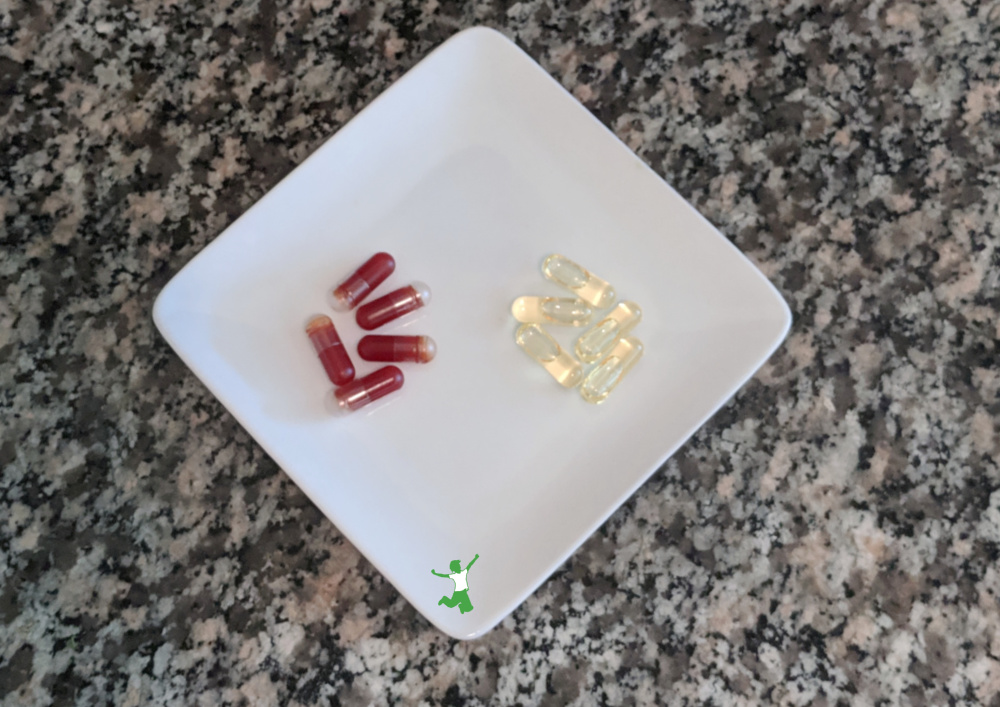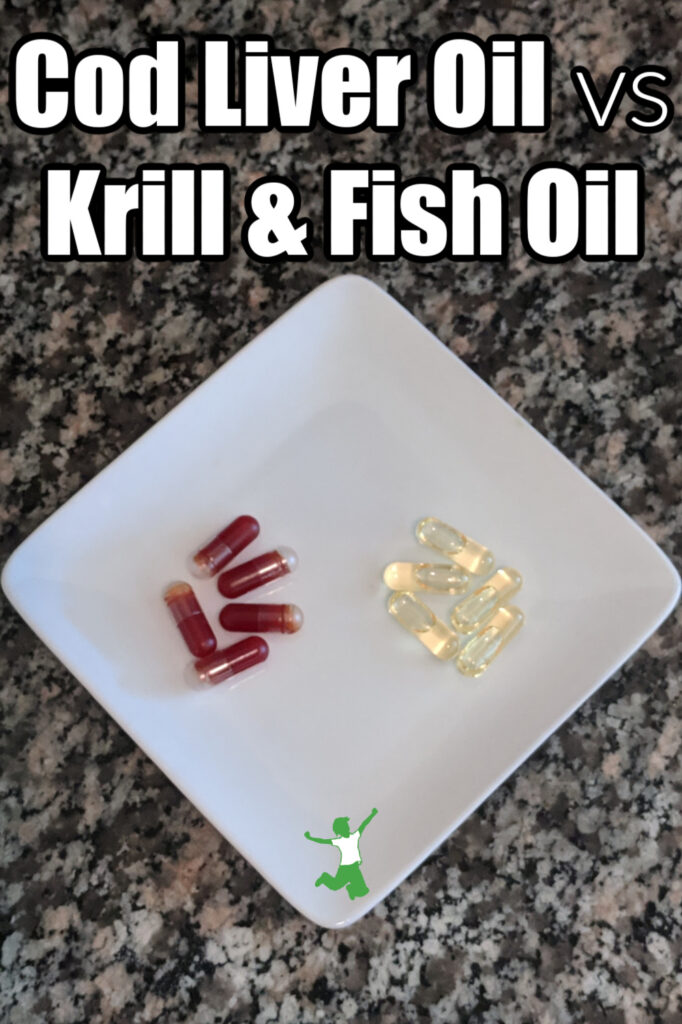Comparison of krill oil to cod liver, fish, and other marine oils in nutritional value, omega-3 fatty acids, and fat-soluble vitamins A and D.

Every ocean on planet Earth contains an abundance of tiny animals known as krill. Measuring only about two inches in size, they are uniquely positioned at the base of the food chain along with other organisms such as zooplankton, sardines, and minnows.
Thousands of diverse animal species rely on krill for food including birds, fish, and whales.
In recent years, supplements derived from these creatures, most notably krill oil, have enjoyed a surge in popularity sometimes as an alternative to fish oil or fish liver oils.
Is such a substitution wise? Does krill oil offer benefits not found in other marine oils?
Let’s see what the research says.
What is Krill Oil?
Krill oil is an omega-3 fatty acid-rich macronutrient derived from processing ocean-based krill.
The word “krill” derives from the Norwegian language. It literally means “small fry of fish”, which is technically inaccurate because krill are invertebrate members of the large arthropod subphylum, Crustacea.
To date, approximately 85 species of krill are known to scientists. They congregate together in large swarms that at certain times of year are even visible from space! (1)
Nutritional Benefits
Being at the bottom of the food web means that krill have a much lower probability of contamination from pollution, hence their popularity in supplements such as krill oil.
In addition, many species favor colder waters that tend to be more pristine though this is not always the case.
Superior Omega-3 Fatty Acids
Pure krill oil is an excellent source of the long-chain omega-3s fatty acids EPA (eicosapentaenoic acid) and DHA (docosahexaenoic acid).
Unlike short-chain plant-based omega-3 fats found in foods like flax, chia, canola, and hemp seed, long-chain omega-3 fats require no conversion by the body and can be immediately utilized.
This plant-based precursor (alpha-linolenic acid – ALA), while essential in and of itself, has a very low rate of conversion to EPA and DHA. The process is similar to the poor conversion of beta carotene in vegetables to true Vitamin A.
In those with gut issues, the conversion may not take place at all.
Hence, a person cannot consume enough plant-based omega-3 to achieve healthy levels of EPA and DHA. (2)
Plant-based eaters take note!
For these reasons, the omega-3 fats in krill oil are superior to those found in plant foods.
Phospholipids
Most of the omega-3 fats in krill oil are in phospholipid form. This is different from the pure triglyceride form of omega-3 fats found in fish oil or raw cod liver oil.
Research suggests that phospholipid omega-3 fats are particularly beneficial to human biology and even preferable to the triglyceride form. (3)
Why?
The presence of phospholipids allows the transport of omega-3 fats by the blood to where they are needed most. This enhanced mobility increases absorptive potential dramatically, perhaps by as much as 10-15 times. (4)
Phospholipid fatty acids represent key structural components of our cells. These important fats play a vital role in cell membrane functioning, which in turn positively affects the overall functioning of our tissues and organs.
Vitamins A & D
Most sources suggest that krill oil is devoid of Vitamins A and D. However, this is not entirely true.
Some quality sources of krill oil (such as this one) contain approximately 100 IU of natural Vitamin A per gram. While small compared to fish liver oils, it is still present.
Krill oil does not naturally contain any other fat-soluble vitamins including Vitamin D, E, or K2 (unless added by the supplement manufacturer).
Astaxanthin
Astaxanthin is a naturally occurring carotenoid. It is especially plentiful in zooplankton and krill which accumulate it in their bodies by consuming phytoplankton.
This powerful substance has 550 times the antioxidant strength of vitamin E and 6000 times that of natural Vitamin C.
Astaxanthin promotes skin health, endurance, and immune support in humans. It also supports eye health and reduces inflammation by reducing free radical activity. (5)
Krill oil is a natural source of astaxanthin albeit at low levels.
Is Krill Oil Sustainable?
Despite their tiny size, krill can live a very long time…up to 10 years!
This surprising fact combined with their astronomically large numbers does not mean that sustainability and method of harvesting aren’t an issue, however.
Be sure that the source you choose utilizes eco-harvesting methods to prevent the death of non-krill species (I suggest this vetted brand).
It is also important to choose a krill oil that is produced using ecologically sound methods.
For example, extraction of oil must not involve solvents in the manufacturing process as these substances are not only carcinogenic but also highly polluting to the environment.
Now that we’ve reviewed the benefits of krill oil, let’s make some conclusions.
Krill versus Plain Fish Oil
Without a doubt, krill oil is a far better choice than fish oil as an omega-3 supplement.
The omega-3 fatty acids from krill are primarily in phospholipid form, which is more potent and better absorbed than the triglyceride form found in fish oil. (3)
Secondly, krill oil contains small amounts of astaxanthin, a strong anti-oxidant. This protects it from oxidation better than fish oil, which contains none.
A case could also be made that krill oil is a more sustainable source of marine-based omega-3 fats than fish oil.
This is because a tiny amount – around 1-2% – of the total krill biomass is harvested each year. This process is
On the other hand, the overfishing of species used to produce fish oil is a much more serious and unregulated problem worldwide.
What About Cod Liver Oil?
While the case for krill oil over fish oil is cut and dry, the comparison is less clear for cod liver oil.
Here is a review of the Dropi brand, which is what our family has used since 2015.
When it comes to cod liver oil, most brands should definitely be avoided. They are highly processed and contain Vitamins A and D that are either synthetic and/or are not in their natural ratios.
Virgin fish liver oils are another matter entirely.
This beneficial supplement contains Vitamins A and D in the proper synergistic ratio in an unheated, optimally bioavailable form.
I suggest this brand and this brand as quality sources to consider.
Thus, if you are seeking a natural source of natural Vitamins A and D, unheated virgin fish liver oils are definitely your best bet over krill oil.
With regard to omega-3 fats, both fish liver oils and krill oil contain them. However, the phospholipids in krill oil are not present in fish liver oil.
In other words, from an omega-3 perspective, krill oil is a better choice than fish liver oils.
Best Marine Oil
In conclusion, research suggests skipping the fish oil entirely and choosing either virgin fish liver oil or krill oil.
Need a marine oil supplement primarily for omega-3 fatty acids? If so, choose sustainable krill oil (this is my preferred source) as it offers phospholipids, the most beneficial form.
If you do not consume organ meats in your diet and thus need marine oil as a natural source of true Vitamin A and D, choose raw virgin cod liver oil (I recommend this brand and this brand).
The best way to go is to have both in your pantry, food budget permitting.
If you can only afford one, choose virgin cod liver oil as it contains both Vitamins A/D and omega-3 fats (albeit not in the more potent state).
Allergic to Fish or Shellfish?
For those who are allergic to fish or shellfish and cannot easily tolerate marine oils in the diet, I suggest considering these alternatives to cod liver oil.

References
(1) Krill Oil: Make this Omega-3 Supplement Part of Your Health Regimen
(2) Omega-3 Fats from Plants vs Animals
(3) Overview of Omega-3 Fatty Acid Therapies
(4) Invertebrates: Visual Atlas of Science
(5) Astaxanthin: Sources, Extraction, Stability, Biological Activities, and Its Commercial Applications—A Review








I was taking Rosita CLO which I really liked but I saw a chart comparing this brand with Jigsaw brand and now have bought this one instead. I also have been taking straight astaxanthin for the past 16 years and will continue it for as long as I possibly can.
Hi Sarah,
Since discovering your blog, I have been taking 1 tsp of Dropi Cod Liver Oil daily and 2.5 – 3 ounces of Desiccated Liver weekly. After reading this, I’m wondering if I’m getting too much Vitamin A etc and should possible switch from Cod Liver Oil to Krill Oil, but then I would be missing out on the vitamin D found in Cod Liver Oil. Should I continue with the 1 tsp of Dropi Cod Liver Oil daily and 2.5 – 3 ounces of Desiccated Liver weekly?
Sarah, I take the dosage of Perfect Supplements liver pills and the all organ pills (trading those off). I also take a high quality krill. I am 70 and wanting to protect my teeth but would adding the fermented cod liver oil (Dropi) be overdoing it?
I have been experiencing an irregular heartbeat since I started taking Krill Oil. Have you heard of this happening to anyone else?
Hi Sarah, since you are on the subject of oils, I would love to hear your thoughts on the subject of eating to many omega 6 fats. Dr. Mercola and many others are pounding this to death saying we should eliminate all seed oils from out diets and severely limit nuts and seeds. Have you done an article of this subject? Many thanks. Jim
A palmful of nuts per day is the max a person should be consuming.
For Vitamin D…IODINE that is where the cod fish got the oil…Iodine three (3) weeks on one (1) week off!
according to Dr. Bond Think Naturally…next Activation Products are saying Vitamin D should always be
taken cilantro oil?
what about the CLO of Green Pasture?
in the link above: Our products are inspired by the research of Dr. Weston A. Price who traveled to various parts of the world to study traditional diets. He discovered what he referred to as high-vitamin butter oil and combined it with cod liver oil to support the health of his patients in Cleveland, Ohio with great success.
In that spirit, we produce Fermented Cod Liver Oil and Concentrated Butter Oil in a variety of flavors that are bottled in liquid, gel and capsule form. We also offer Fermented Skate Liver Oil, Organic Virgin Coconut Oil, Virgin Coconut Ghee and a Complete Oil Blend. Lastly, we produce skin care balms and various by-products that enrich the soil in gardens and on pasture, as well as the feed of farm animals.
This brand is fine, but I don’t use it as I prefer Dropi. https://www.thehealthyhomeeconomist.com/go/dropi/
Use whatever suits you best!
I am an avid reader of your blogs and have learned so much over the years but I came across this article and felt the need to share it. Could you comment on it please. Thank-you, Elsha.
omegavia.com/krill-oil-misinformation/
I think the article’s take that krill oil is not necessarily more stable than fish oil is interesting. Even if they are equal, however, it is indisputable that the omega-3 fats in krill oil are superior to those in plain fish oil. High vitamin cod liver oil adds the important benefit of natural A/D, however, so this marine oil also trumps plain fish oil. Hope that helps.